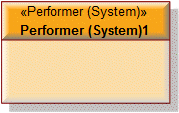Performer (system) (UPDM - DoDAF aliases)

Creation
To create a Performer (System):
◦ From an
Architectural Description or
Service Description: right-click the Architectural Description or Service Description, point to New, point to DoDAF, point to System, and then click Performer (System).
◦ From a
Performer (System): right-click the Performer (System), point to New, point to DoDAF, point to System, and then click Performer (System).
Appearance
When shown on an
SV-1 Systems Interface Definition,
SV-1 Systems Interface Definition,
SV-5 Function to Operational Activity/Service Function Definition or
SV-9 Systems Technology and Skills Forecast Definition, a Performer (System) appears as follows:

When shown on an
SV-1 Systems Interaction Specification or
SV-2 Systems Resource Flow Description, a Performer (System) appears as follows:

Relationships
The following relationships are of importance to a Performer (System):
◦ UML Generalizations define Performer (System) inheritance (SV-1 Systems Interface Definition).
◦
Forecast relationships link a Performer (System) to forecasted future Performer (System) elements.
◦
Activity Performed by Performer relationships link a Performer (System) to
Activity (System) elements that the Performer (System) can perform.
◦
Implements relationships link a Performer (System) to the
Performer (Operational) and
Security Domain elements it implements.
◦ Used as a conveyed classifier for
Operational Exchange elements.
The following sections provide information about how a Performer (System) is used in the model.
Create a Performer (System) from
Create from a Performer (System)
In addition to the UPDM elements that can be created from all UPDM elements (
Representation,
Definition,
Information, and
Metadata):
Shown on these diagrams, tables and matrices
In addition to the
AV-2 Integrated Dictionary and
StdV-1 Standards Profile, which can show all UPDM elements:
UPDM writeable properties
The following writeable properties are available on the Performer (System) tab of a Performer (System) element's Property Pages:
◦ isEncapsulated
◦ URI































